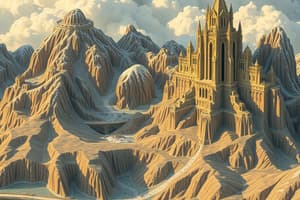Podcast
Questions and Answers
भौतिक भूगोल की मुख्य शाखाएँ कौन-कौन सी हैं?
भौतिक भूगोल की मुख्य शाखाएँ कौन-कौन सी हैं?
भौतिक भूगोल की मुख्य शाखाएँ भू-रूपरेखा, जलवायु, और प्राकृतिक संसाधनों में विभाजित होती हैं।
भूगोल का अध्ययन क्या है?
भूगोल का अध्ययन क्या है?
भूगोल भूमि की भौतिक विशेषताओं, इसके निवासियों के वितरण, और मानव और प्राकृतिक पर्यावरण को आकार देने वाली प्रक्रियाओं का अध्ययन है।
भौतिक भूगोल किसे कहा जाता है?
भौतिक भूगोल किसे कहा जाता है?
भौतिक भूगोल भूमि की भौतिक विशेषताओं का अध्ययन करता है, जैसे की पर्वत, नदियाँ और जलवायु।
भूगर्भिकी का अध्ययन क्या है?
भूगर्भिकी का अध्ययन क्या है?
भूतूर्व भूगोल क्या है?
भूतूर्व भूगोल क्या है?
भूतूर्व भूगोल क्यों महत्वपूर्ण है?
भूतूर्व भूगोल क्यों महत्वपूर्ण है?
हम भूतूर्व भूगोल के अध्ययन से क्या लाभ प्राप्त कर सकते हैं?
हम भूतूर्व भूगोल के अध्ययन से क्या लाभ प्राप्त कर सकते हैं?
इस पाठ के आधार पर भूतूर्व भूगोल के बारे में एक सार्थक प्रश्न पूछें।
इस पाठ के आधार पर भूतूर्व भूगोल के बारे में एक सार्थक प्रश्न पूछें।
भू-रूपरेखा का अध्ययन किसे कहलाता है?
भू-रूपरेखा का अध्ययन किसे कहलाता है?
जलवायु क्या है?
जलवायु क्या है?
प्राकृतिक संसाधन क्या हैं?
प्राकृतिक संसाधन क्या हैं?
भौतिक भूगोल क्यों महत्वपूर्ण है?
भौतिक भूगोल क्यों महत्वपूर्ण है?
भौतिक भूगोल का अध्ययन कैसे महत्वपूर्ण है?
भौतिक भूगोल का अध्ययन कैसे महत्वपूर्ण है?
भू-रूपरेखाओं का अध्ययन क्या करते हैं भौतिक भूगोलकार?
भू-रूपरेखाओं का अध्ययन क्या करते हैं भौतिक भूगोलकार?
जलवायु कैसे भू-सतह को आकार देता है?
जलवायु कैसे भू-सतह को आकार देता है?
प्राकृतिक संसाधनों के अध्ययन में भौतिक भूगोल की क्या भूमिका है?
प्राकृतिक संसाधनों के अध्ययन में भौतिक भूगोल की क्या भूमिका है?
Study Notes
Introduction to Geography
Geography is the study of the Earth's physical features, the distribution of its inhabitants, and the processes that shape the human and natural environments. It is a combination of physical geography, which focuses on the Earth's physical features, and human geography, which explores how human societies take advantage of and modify the Earth's features. This article will delve into the fascinating world of physical geography.
Physical Geography
Physical geography is a subfield of geography that deals with the Earth's physical features, such as mountains, rivers, and climate. It is the study of the Earth's physical features and the processes that shape them, and it is divided into three main branches: geomorphology, climate, and natural resources.
Geomorphology
Geomorphology is the study of the Earth's surface and the processes that shape it. These processes can include the movement of tectonic plates, erosion, and weathering. Geomorphologists study the features created by these processes, such as mountains, valleys, and plateaus. They also study how these features have changed over time and the effects they have on the environment.
Climate
Climate is another essential aspect of physical geography. It is the long-term weather pattern of a specific region or area. Climate is determined by a variety of factors, including the Earth's position in its orbit around the sun, the location of a region, and the interactions between the land and water. Climate plays a significant role in shaping the Earth's surface, as it determines the types of plants and animals that can live in a particular area, as well as the distribution of natural resources.
Natural Resources
Natural resources are the raw materials found in the Earth's surface that can be used by humans. These resources can include water, timber, minerals, and fossil fuels. Physical geography plays a significant role in the study of natural resources, as it helps us understand where these resources are located and how they can be extracted and used.
The Importance of Physical Geography
Physical geography is essential for understanding the Earth's surface and the processes that shape it. It helps us understand how climate affects the distribution of plants and animals, how natural resources are formed and found, and how the Earth's surface has changed over time. Physical geography also has practical applications, such as in the development of infrastructure projects, the management of natural resources, and the prediction of natural disasters.
In conclusion, physical geography is a fascinating field that helps us understand the Earth's physical features and the processes that shape them. It is essential for understanding the natural world and for managing our resources sustainably. By studying physical geography, we can gain a deeper appreciation for the beauty and complexity of our planet.
Studying That Suits You
Use AI to generate personalized quizzes and flashcards to suit your learning preferences.
Description
Explore the world of physical geography, which encompasses the study of the Earth's physical features, processes that shape the human and natural environments, and the distribution of its inhabitants. Delve into subfields like geomorphology, climate, and natural resources.




